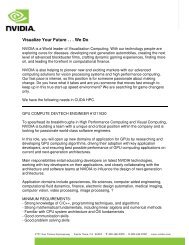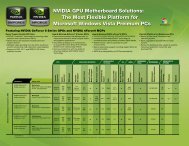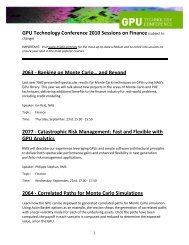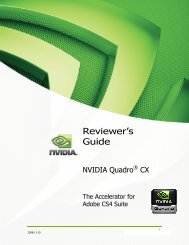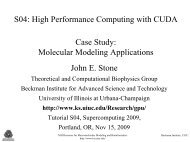High-Productivity CUDA Development with the Thrust Template ...
High-Productivity CUDA Development with the Thrust Template ...
High-Productivity CUDA Development with the Thrust Template ...
You also want an ePaper? Increase the reach of your titles
YUMPU automatically turns print PDFs into web optimized ePapers that Google loves.
<strong>High</strong>-<strong>Productivity</strong> <strong>CUDA</strong> <strong>Development</strong><br />
<strong>with</strong> <strong>the</strong> <strong>Thrust</strong> <strong>Template</strong> Library<br />
San Jose Convention Center | September 23 rd 2010 | Nathan Bell (NVIDIA Research)
Diving In<br />
#include <br />
#include <br />
#include <br />
#include <br />
int main(void)<br />
{<br />
// generate 32M random numbers on <strong>the</strong> host<br />
thrust::host_vector h_vec(32
Objectives<br />
� Programmer productivity<br />
— Build complex applications quickly<br />
� Encourage generic programming<br />
— Leverage parallel primitives<br />
� <strong>High</strong> performance<br />
— Efficient mapping to hardware
What is <strong>Thrust</strong>?<br />
� A template library for <strong>CUDA</strong><br />
— Mimics <strong>the</strong> C++ STL<br />
� Containers<br />
— On host and device<br />
� Algorithms<br />
— Sorting, reduction, scan, etc.
Containers<br />
� Concise and readable code<br />
— Avoids common memory management errors<br />
// allocate host vector <strong>with</strong> two elements<br />
thrust::host_vector h_vec(2);<br />
// copy host vector to device<br />
thrust::device_vector d_vec = h_vec;<br />
// write device values from <strong>the</strong> host<br />
d_vec[0] = 13;<br />
d_vec[1] = 27;<br />
// read device values from <strong>the</strong> host<br />
std::cout
Containers<br />
� Compatible <strong>with</strong> STL containers<br />
// list container on host<br />
std::list h_list;<br />
h_list.push_back(13);<br />
h_list.push_back(27);<br />
// copy list to device vector<br />
thrust::device_vector d_vec(h_list.size());<br />
thrust::copy(h_list.begin(), h_list.end(), d_vec.begin());<br />
// alternative method using vector constructor<br />
thrust::device_vector d_vec(h_list.begin(), h_list.end());
Namespaces<br />
� Avoid name collisions<br />
// allocate host memory<br />
thrust::host_vector h_vec(10);<br />
// call STL sort<br />
std::sort(h_vec.begin(), h_vec.end());<br />
// call <strong>Thrust</strong> sort<br />
thrust::sort(h_vec.begin(), h_vec.end());<br />
// for brevity<br />
using namespace thrust;<br />
// <strong>with</strong>out namespace<br />
int sum = reduce(h_vec.begin(), h_vec.end());
Iterators<br />
� Pair of iterators defines a range<br />
// allocate device memory<br />
device_vector d_vec(10);<br />
// declare iterator variables<br />
device_vector::iterator begin = d_vec.begin();<br />
device_vector::iterator end = d_vec.end();<br />
device_vector::iterator middle = begin + 5;<br />
// sum first and second halves<br />
int sum_half1 = reduce(begin, middle);<br />
int sum_half2 = reduce(middle, end);<br />
// empty range<br />
int empty = reduce(begin, begin);
Iterators<br />
� Iterators act like pointers<br />
// declare iterator variables<br />
device_vector::iterator begin = d_vec.begin();<br />
device_vector::iterator end = d_vec.end();<br />
// pointer arithmetic<br />
begin++;<br />
// dereference device iterators from <strong>the</strong> host<br />
int a = *begin;<br />
int b = begin[3];<br />
// compute size of range [begin,end)<br />
int size = end - begin;
Iterators<br />
� Encode memory location<br />
— Automatic algorithm selection<br />
// initialize random values on host<br />
host_vector h_vec(100);<br />
generate(h_vec.begin(), h_vec.end(), rand);<br />
// copy values to device<br />
device_vector d_vec = h_vec;<br />
// compute sum on host<br />
int h_sum = reduce(h_vec.begin(), h_vec.end());<br />
// compute sum on device<br />
int d_sum = reduce(d_vec.begin(), d_vec.end());
Algorithms<br />
� Elementwise operations<br />
— for_each, transform, ga<strong>the</strong>r, scatter …<br />
� Reductions<br />
— reduce, inner_product, reduce_by_key …<br />
� Prefix-Sums<br />
— inclusive_scan, inclusive_scan_by_key …<br />
� Sorting<br />
— sort, stable_sort, sort_by_key …
Algorithms<br />
� Process one or more ranges<br />
// copy values to device<br />
device_vector A(10);<br />
device_vector B(10);<br />
device_vector C(10);<br />
// sort A in-place<br />
sort(A.begin(), A.end());<br />
// copy A -> B<br />
copy(A.begin(), A.end(), B.begin());<br />
// transform A + B -> C<br />
transform(A.begin(), A.end(), B.begin(), C.begin(), plus());
Algorithms<br />
� Standard operators<br />
// allocate memory<br />
device_vector A(10);<br />
device_vector B(10);<br />
device_vector C(10);<br />
// transform A + B -> C<br />
transform(A.begin(), A.end(), B.begin(), C.begin(), plus());<br />
// transform A - B -> C<br />
transform(A.begin(), A.end(), B.begin(), C.begin(), minus());<br />
// multiply reduction<br />
int product = reduce(A.begin(), A.end(), 1, multiplies());
Algorithms<br />
� Standard data types<br />
// allocate device memory<br />
device_vector i_vec = ...<br />
device_vector f_vec = ...<br />
// sum of integers<br />
int i_sum = reduce(i_vec.begin(), i_vec.end());<br />
// sum of floats<br />
float f_sum = reduce(f_vec.begin(), f_vec.end());
Custom Types & Operators<br />
struct negate_float2<br />
{<br />
__host__ __device__<br />
float2 operator()(float2 a)<br />
{<br />
return make_float2(-a.x, -a.y);<br />
}<br />
};<br />
// declare storage<br />
device_vector input = ...<br />
device_vector output = ...<br />
// create function object or ‘functor’<br />
negate_float2 func;<br />
// negate vectors<br />
transform(input.begin(), input.end(), output.begin(), func);
Custom Types & Operators<br />
// compare x component of two float2 structures<br />
struct compare_float2<br />
{<br />
__host__ __device__<br />
bool operator()(float2 a, float2 b)<br />
{<br />
return a.x < b.x;<br />
}<br />
};<br />
// declare storage<br />
device_vector vec = ...<br />
// create comparison functor<br />
compare_float2 comp;<br />
// sort elements by x component<br />
sort(vec.begin(), vec.end(), comp);
Custom Types & Operators<br />
// return true if x is greater than threshold<br />
struct is_greater_than<br />
{<br />
int threshold;<br />
};<br />
is_greater_than(int t) { threshold = t; }<br />
__host__ __device__<br />
bool operator()(int x) { return x > threshold; }<br />
device_vector vec = ...<br />
// create predicate functor (returns true for x > 10)<br />
is_greater_than pred(10);<br />
// count number of values > 10<br />
int result = count_if(vec.begin(), vec.end(), pred);
Interoperability<br />
� Convert iterators to raw pointers<br />
// allocate device vector<br />
thrust::device_vector d_vec(4);<br />
// obtain raw pointer to device vector’s memory<br />
int * ptr = thrust::raw_pointer_cast(&d_vec[0]);<br />
// use ptr in a <strong>CUDA</strong> C kernel<br />
my_kernel>(N, ptr);<br />
// Note: ptr cannot be dereferenced on <strong>the</strong> host!<br />
18
Interoperability<br />
� Wrap raw pointers <strong>with</strong> device_ptr<br />
// raw pointer to device memory<br />
int * raw_ptr;<br />
cudaMalloc((void **) &raw_ptr, N * sizeof(int));<br />
// wrap raw pointer <strong>with</strong> a device_ptr<br />
device_ptr dev_ptr(raw_ptr);<br />
// use device_ptr in thrust algorithms<br />
fill(dev_ptr, dev_ptr + N, (int) 0);<br />
// access device memory through device_ptr<br />
dev_ptr[0] = 1;<br />
// free memory<br />
cudaFree(raw_ptr);<br />
19
Recap<br />
� Containers manage memory<br />
— Help avoid common errors<br />
� Iterators define ranges<br />
— Know where data lives<br />
� Algorithms act on ranges<br />
— Support general types and operators
Example: Weld Vertices<br />
� Review: Marching Cubes<br />
case 0 case 1<br />
case 2 case 3<br />
...
Example: Weld Vertices<br />
� Problem: Marching Cubes produces “triangle soup”<br />
� “Weld” redundant vertices toge<strong>the</strong>r into a connected mesh<br />
2<br />
5<br />
0 1<br />
4<br />
3<br />
8<br />
6 7<br />
2 3<br />
0 1<br />
4
Example: Weld Vertices<br />
Procedure:<br />
1. Sort triangle vertices<br />
2. Collapse spans of like vertices<br />
3. Search for each vertex’s unique index
Step 1: Sort triangle vertices<br />
// a predicate sorting float2 lexicographically<br />
struct float2_less<br />
{<br />
__host__ __device__<br />
bool operator()(float2 a, float2 b)<br />
{<br />
if(a.x < b.x) return true;<br />
if(a.x > b.x) return false;<br />
return a.y < b.y;<br />
}<br />
};<br />
// storage for input<br />
device_vector input = ...<br />
// allocate space for output mesh representation<br />
device_vector vertices = input;<br />
device_vector indices;<br />
// sort vertices to bring duplicates toge<strong>the</strong>r<br />
sort(vertices.begin(), vertices.end(), float2_less());
Step 2: Collapse like vertices<br />
// an equivalence relation for float2<br />
struct float2_equal_to<br />
{<br />
__host__ __device__<br />
bool operator()(float2 a, float2 b)<br />
{<br />
return a.x == b.x && a.y == b.y;<br />
}<br />
};<br />
// find unique vertices<br />
device_vector::iterator new_end;<br />
new_end = unique(vertices.begin(),<br />
vertices.end(),<br />
float2_equal_to());<br />
// erase <strong>the</strong> redundancies<br />
vertices.erase(new_end, vertices.end());<br />
? ? ? ?
Step 3: Search for vertex indices<br />
// find <strong>the</strong> index of each input vertex in <strong>the</strong> list of unique vertices<br />
lower_bound(vertices.begin(), vertices.end(),<br />
input.begin(), input.end(),<br />
indices.begin(),<br />
float2_less());
Thinking Parallel<br />
� Leverage generic algorithms<br />
— Sort, reduce, scan, etc.<br />
— Often faster than application-specific algorithms<br />
� Best practices<br />
— Use fusion to conserve memory bandwidth<br />
— Consider memory layout tradeoffs<br />
— Attend <strong>Thrust</strong> By Example session for details!
Leveraging Parallel Primitives<br />
� Use sort liberally<br />
data type std::sort tbb::parallel_sort thrust::sort<br />
char 25.1 68.3 3532.2<br />
short 15.1 46.8 1741.6<br />
int 10.6 35.1 804.8<br />
long 10.3 34.5 291.4<br />
float 8.7 28.4 819.8<br />
double 8.5 28.2 358.9<br />
Intel Core i7 950 NVIDIA GeForce 480
Input-Sensitive Optimizations<br />
Sorting Rate (Mkey/s)<br />
2500<br />
2000<br />
1500<br />
1000<br />
500<br />
0<br />
0 2 4 6 8 10 12 14 16 18 20 22 24 26 28 30 32<br />
Key Bits
Reductions<br />
Algorithm Description<br />
reduce Sum of a sequence<br />
find First position of a value in a sequence<br />
mismatch First position where two sequences differ<br />
inner_product Dot product of two sequences<br />
equal Whe<strong>the</strong>r two sequences are equal<br />
min_element Position of <strong>the</strong> smallest value<br />
count Number of instances of a value<br />
is_sorted Whe<strong>the</strong>r sequence is in sorted order<br />
transform_reduce Sum of transformed sequence
<strong>Thrust</strong> on Google Code<br />
� Quick Start Guide<br />
� Examples<br />
� Documentation<br />
� Mailing List (thrust-users)
What’s new in <strong>Thrust</strong> v1.3<br />
� Performance improvements<br />
— 3x faster sorting<br />
— 2x faster stream compaction<br />
� New features<br />
— Algorithms mismatch, find_if, reverse<br />
— System exceptions
Can I use <strong>Thrust</strong>?<br />
� Extensively tested<br />
— 600+ unit tests<br />
� Open Source<br />
— Permissive License (Apache v2)<br />
� Active community<br />
— 200+ members on cusp-users
Later Today…<br />
2220 - <strong>Thrust</strong> by Example: Advanced Features and Techniques<br />
<strong>Thrust</strong> is a parallel template library for developing <strong>CUDA</strong> applications which is modeled after<br />
<strong>the</strong> C++ Standard <strong>Template</strong> Library (STL). In this session we'll show how to implement<br />
decompose problems into <strong>the</strong> algorithms provided by <strong>Thrust</strong>. We'll also discuss <strong>the</strong><br />
performance implications of "kernel fusion" and "array of structs" vs. "structure of arrays"<br />
memory layouts and how <strong>the</strong>y relate to <strong>Thrust</strong>. Lastly, we'll present evidence that <strong>Thrust</strong><br />
implementations are fast, while remaining concise and readable<br />
Speaker: Jared Hoberock, NVIDIA<br />
Topic: Tools & Libraries<br />
Time: Thursday, September, 23rd, 14:00 - 14:50<br />
Location: Room B
Acknowledgments<br />
� Andrew Corrigan<br />
� Bastiaan Aarts<br />
� Boost Developers<br />
� Duane Merrill<br />
� Erich Elsen<br />
� Gregory Diamos<br />
� Mark Harris<br />
� Michael Garland<br />
� Nadathur Satish<br />
� <strong>CUDA</strong> Group<br />
� Ryuta Suzuki<br />
� Shubho Sengupta<br />
� Thomas Bradley



